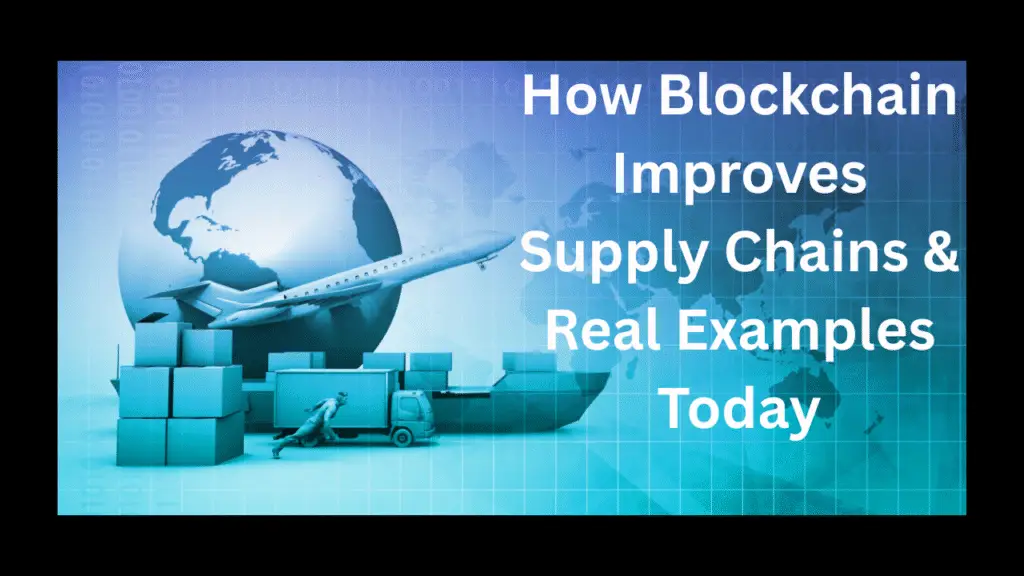Supply chains are the lifeblood of global commerce—but they’re often complex, opaque, and vulnerable to inefficiencies and fraud. Enter blockchain: a technology that’s redefining how goods are tracked, verified, and moved across the world.
With its ability to provide transparency, traceability, and trust, blockchain is quickly becoming a game-changer in supply chain management. In this post, we’ll explore how blockchain enhances supply chains—making them smarter, faster, and more secure than ever before.
Blockchain offers several benefits for supply chain management. Let’s explore how it makes supply chains better:
1. Transparency
With blockchain, every step of the supply chain is recorded and visible to everyone involved. For example, a coffee shop could use blockchain to track its beans all the way from the farm to the store. Customers could even scan a QR code on the coffee bag to see where the beans came from and how they were processed.
2. Efficiency
Traditional supply chains rely on paper documents and multiple middlemen. This can cause delays and mistakes. Blockchain replaces these old methods with digital records that update in real-time, making the process faster and more efficient.
3. Security
Blockchain’s secure design makes it nearly impossible to alter or hack the data. This ensures that the information is accurate and trustworthy.
4. Fighting Counterfeits
Fake products are a big problem in industries like medicine and fashion. Blockchain helps prevent counterfeits by providing a verified record of each product’s journey through the supply chain.
Real-World Examples of Blockchain in Supply Chains
Blockchain isn’t just a theory—it’s already being used in supply chains around the world. Here are two examples:
1. IBM Food Trust
IBM Food Trust is a blockchain platform that helps food companies track their products. For instance, Walmart uses this platform to trace the origin of its produce. If there’s ever a food safety issue, Walmart can quickly identify the source and remove the affected items from shelves.
2. Everledger
Everledger uses blockchain to track valuable items like diamonds. Each diamond is given a digital record, including details like its size, color, and origin. This helps buyers confirm that their diamonds are real and ethically sourced. Everledger is built upon the Hyperledger Fabric blockchain platform. Interestingly, this platform is a private blockchain, where first need the ability to share data securely and apply smart contract, while also retaining privacy.
Benefits of Blockchain for Businesses and Consumers
Blockchain offers advantages for everyone involved in the supply chain:
For Businesses:
Faster and more efficient processes.
- Reduced costs by cutting out unnecessary middlemen.
- Improved customer trust through transparency.
- For Consumers:
Assurance that products are genuine and safe.
- Knowledge about where products come from and how they’re made.
- Faster responses to recalls or safety issues.
- Challenges Facing Blockchain in Supply Chains
While blockchain has many benefits, it also faces some challenges:
1. Cost of Implementation
Setting up a blockchain system can be expensive, especially for small businesses.
2. Technology Adoption
Not all companies are familiar with blockchain, and some may be hesitant to adopt it.
3. Scalability
Blockchain systems need to be able to handle large amounts of data as supply chains grow.
Despite these challenges, blockchain’s potential to improve supply chains is too big to ignore.
The Future of Blockchain in Supply Chains
As technology advances, we’ll see even more creative uses for blockchain in supply chains. For example, blockchain could help with sustainability by tracking a product’s environmental impact. It could also make international trade faster and more reliable by simplifying customs processes.
In the future, blockchain might become a standard tool for supply chains across industries, helping to create a world where products are delivered faster, safer, and with greater transparency.
Why Blockchain Matters for Supply Chains
Blockchain is more than just a buzzword—it’s a powerful tool that can solve real problems in supply chains. By providing transparency, efficiency, and security, blockchain is helping businesses deliver better products and services to consumers.
Whether it’s ensuring your food is safe, your clothes are authentic, or your electronics arrive on time, blockchain is making supply chains smarter and more reliable.
Join the Blockchain Revolution—Subscribe to Web3Wonders.US
Are you fascinated by how blockchain is transforming supply chains and other industries? At Web3Wonders.US, we’re dedicated to exploring the incredible potential of blockchain and Web3 technology.
Subscribe to Web3Wonders.US.US.US today to stay updated on the latest innovations, stories, and case studies. Whether you’re a business owner, a tech enthusiast, or just curious about the future, our blogs will keep you informed and inspired.
Be part of the change—join us on this exciting journey into the future of blockchain and beyond!


I love playing games on laro777bet and then wagering my winnings playing e-sports. I recommend it! Go play laro777bet, you wont regret it!
Esportedasorte… If you’re into esports, give this one a look. Could be your lucky day. esportedasorte
BingoPluscom, is exactly what it sounds like. If you are ready for some bingo, then bingopluscom is waiting for you.
49jiliph? Okay, I’ll be real. It’s pretty basic, but hey, sometimes simple is good. I’d say go have a look and see what you think: 49jiliph
307bet… It’s an Okay site, nothing to special. I’d look for better alternatives before betting here. Here’s the 307bet if you still want to see.
555win12… not gonna lie, the name is a bit weird, but the site’s not bad! Found some interesting games there. Worth a peek if you’re looking for something different. Find out more: 555win12
Saw a few ads for f8betlgoptimusl9, decided to check it out. Not bad, not bad. The welcome bonus is pretty sweet, gonna see what else they got! Excited to explore f8betlgoptimusl9.
Hey ever used ninogamingcom? Good user experience and great customer support Worth checking out if you want to game securely ninogamingcom
Alright, 3reyes… let’s see what you got. Always searching for the next big thing. I hope this delivers a fun experience. Checking out 3reyes now!
Infinitocasino, eh? Sounds like non-stop fun! I’m looking for a casino with a great selection of games and a user-friendly interface. Hoping for a good experience with infinitocasino!